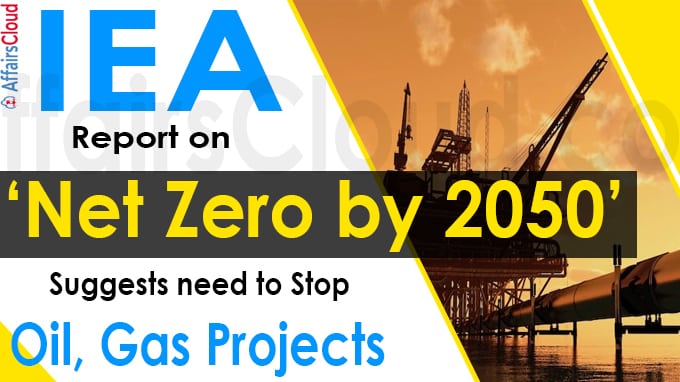
According to the report ‘Net Zero by 2050’ released by the International Energy Agency (IEA) – Halting new oil, gas, and coalfields will be key to achieving Net Zero Global Carbon emissions by 2050.
- Achieving Net Zero emissions is vital to limit the increase in average global temperatures to less than 1.5 degree Celsius.
- The current pledges of the Nations across the world are insufficient to curb global temperature rise, they will result in an increase of 2.1 degrees Celsius by 2050.
Road map for Net-Zero emissions
i.The report has listed a new road map for achieving net-zero global carbon emissions setting around 400 milestones.
- Energy investment needs to increase to USD 5 trillion a year by 2030 from USD 2 Trillion at present to achieve net zero emissions.
- Installation of Solar photovoltaic additions should reach 630 GigaWatts (GW) a year by 2030, Wind power needs to increase to 390 GW. It is four times the target set in 2020 for new capacity additions.
- Almost 90% of electricity generation should come from renewables by 2050 and the rest from Nuclear power.
- By 2050, the share of fossil fuels in global energy needs should shrink from 80% (at present) to barely a fifth.
ii.No new coal-fired power stations must be built unless they include technology to capture their emissions.
- Sales of new cars with internal combustion engines would have to end by 2035.
- The share of Electric Vehicles in the global fleet must increase from 5% (at present) to 60% by 2030.
- Oil demand should decline to 24 million barrels a day in 2050.
iii.It also emphasizes on Behavioural changes by consumers, replacing regional air travel with rail & energy efficient building design.
Recent Related News:
April 20, 2021, According to ‘Global Energy Review 2021’ released by IEA, Global CO2 emissions
are set to touch 33 Billion Tonnes in 2021, an increase of 5% compared to 2020 Levels (up by 1.5 Billion Tonnes from 2020). It is the 2nd Largest increase in emissions ever.
About International Energy Agency (IEA)
Executive Director – Dr Fatih Birol
Headquarters – Paris, France




